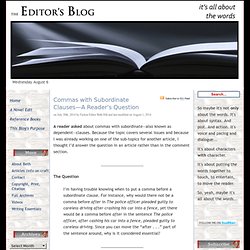

Dependent Clauses and Commas. On July 30th, 2014 by Fiction Editor Beth Hill and last modified on August 1, 2014 A reader asked about commas with subordinate—also known as dependent—clauses.

Because the topic covers several issues and because I was already working on one of the sub-topics for another article, I thought I’d answer the question in an article rather than in the comment section. The Question I’m having trouble knowing when to put a comma before a subordinate clause. For instance, why would there not be a comma before after in The police officer pleaded guilty to careless driving after crashing his car into a fence, yet there would be a comma before after in the sentence The police officer, after cashing his car into a fence, pleaded guilty to careless driving.
The Answer This is a great question because it delves into specifics of comma use with dependent clauses. Because there are several types of dependent clauses—adjective, adverbial, and noun—this topic could get wordy if I tried to cover all of them. Comma Rules - The Plain Language Programme. The Reader's Lament. Notes from the newsroom on grammar, usage and style.

(Some frequently asked questions are here.) Times readers expect nothing but the best in our writing and editing. Too often, they’re disappointed. My colleague Patrick LaForge, who oversees our copy desks, described their dismay and offered some suggestions in this memo to editors: Day after day, devoted Times readers are moved to complain. Mistakes in copy have been a problem since Gutenberg, but it is hard to shake the impression that we have been slipping more than usual, especially in articles that are rushed onto the Web site, bypassing some of our traditional steps.
We get letters, e-mails, phone calls and complaints on Twitter. We often respond, apologizing for our lapses and promising to spread the word. “I’ve read The Times daily for more years than I can remember,” one wrote recently. This era of news publishing has put a greater emphasis on speed, across multiple formats and platforms. In a Word.
Nutty non-rules of grammar. Recently I got a voice mail message from a reader saying that the verb “rise” could be used only with animate subjects, and thus our headline “Speed limit may rise to 75 mph” was incorrect, and it should have said “Speed limit may be raised to 75 mph.”

Turning aside the issue of changing a perfectly good active-voice sentence to a wordier passive, I was intrigued, because I’d never run across this “rule” before. After all, bread rises. The sun rises. No one seems to complain about those. So I turned to the bookshelf. None of our dictionaries said anything about “rise” being restricted to animate subjects. Our usage manuals cite “rise” in distinction to “raise,” the former intransitive and the latter transitive. The “raise” entry in one book reminded me of another “rule” I’d run across: “Raise” is for crops or livestock, “rear” is for children. For the record, these are NOT legitimate rules of English usage: Don’t split infinitives or compound verbs. Don’t use the passive voice. YA Highway: Homophones, or, See Those People Over There? They're Their Worst Nightmare.
Nothing drives the Grammar Groupie more crazy than improper apostrophe usage.

Coming in a close second place, however is misuse of homophones. Perhaps that’s because the two are often related, as in the case of the unholy trinity of homophones, their, there and they’re. Homophones are words that sound the same, but are spelled differently and have different meanings. They delight in confusing writer and non-writer alike. I wish I could direct readers to some clever song or acronym or acrostic to assist in remembering the abundant cases of homophones, but, alas, you simply need a good resource and the ability to memorize in order to master homophones. Misplaced Modifiers. Today's topic is misplaced modifiers.

Of all the writing errors you can make, misplaced modifiers are among the most likely to confuse your readers, but they're also kind of fun because misplaced modifiers can give your sentences silly meanings that you never intended. If you're not careful, you can end up writing that your boss is a corn muffin instead of that your boss invested in corn muffins. I once worked with an editor who e-mailed everyone in the office the especially hilarious sentences created by misplaced modifiers. Each day, we produced enough reports to keep two copy editors busy, and many of the writers were scientists, so there were always lots of opportunities to find misplaced modifiers.
The e-mails were entertaining, unless you were the one who had written the offending sentence. What Are Modifiers? Modifiers are just what they sound like—words or phrases that modify something else. These two sentences mean different things: I ate only vegetables. I only ate vegetables. YA Highway: Grammar.